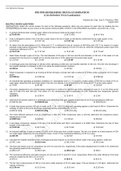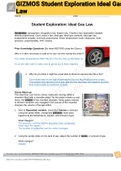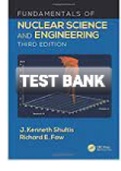Avogadro’s law Study guides, Class notes & Summaries
Looking for the best study guides, study notes and summaries about Avogadro’s law? On this page you'll find 41 study documents about Avogadro’s law.
Page 4 out of 41 results
Sort by

-
Linx Refresher Sept 2012 IPD PPD with Answer < 130 QUESTIONS WITH 100% CORRECT ANSWERS>
- Exam (elaborations) • 7 pages • 2021
-
- $13.49
- + learn more
Linx Refresher Review IPD PPD REFRESHERS TRIVIA EXAMINATION (Linx Refreshers Trivia Examination) Prepared by: Engr. Jose R. Francisco, PME August 2012 MULTIPLE CHOICE QUESTIONS INSTRUCTION: Select the correct answer for each of the following questions. Mark only one answer for each item by shading the box corresponding to the letter of your choice on the answer sheet provided. STRICTLY NO ERASURES ALLOWED. Use pencil No. 1 only. 1. A vertical cylindrical tank contains water. What is the ...

-
Exam (elaborations) Student Exploration Ideal Gas Law
- Exam (elaborations) • 9 pages • 2022
-
- $10.49
- + learn more
Student Exploration: Ideal Gas Law Vocabulary: atmosphere, Avogadro’s law, Boyle’s law, Charles’s law, dependent variable, directly proportional, Gay-Lussac’s law, ideal gas, ideal gas constant, ideal gas law, independent variable, inversely proportional, Kelvin temperature scale, kilopascal, mole, pressure, proportionality, STP, volume Prior Knowledge Questions (Do these BEFORE using the Gizmo.) Why is it often necessary to add air to your car tires during the winter? The colder ...

-
CHEM 120 Final Exam Review
- Exam (elaborations) • 7 pages • 2022
-
- $12.49
- + learn more
CHEM 120 Final Exam Review Questions Covered 1. Know what is the atomic number, atomic mass, protons, neutrons and electrons 2. Describe the shapes of molecules H2S, CBr4, and PCl3 3. Calculating types of bonding (ionic, covalent, nonpolar covalent) 4. Non – polar covalent bonds and polar covalent bonds and electron sharing 5. Know the structure and makeup of DNA and RNA, know what DNA replication, transcription and translation are and ribosomes role in protein synthesis. 6. Know wh...

-
Exam (elaborations) GIZMOS Student Exploration Ideal Gas Law
- Exam (elaborations) • 8 pages • 2022
-
- $6.49
- + learn more
Exam (elaborations) GIZMOS Student Exploration Ideal Gas Law Vocabulary: atmosphere, Avogadro’s law, Boyle’s law, Charles’s law, dependent variable, directly proportional, Gay-Lussac’s law, ideal gas, ideal gas constant, ideal gas law, independent variable, inversely proportional, Kelvin temperature scale, kilopascal, mole, pressure, proportionality, STP, volume Prior Knowledge Questions (Do these BEFORE using the Gizmo.) Why is it often necessary to add air to your car tires ...

-
Exam (elaborations) TEST BANK FOR Problem Solution Manual For Fundamentals of Nuclear Science and Engineering 3rd Edition By J. Kenneth Shultis and Richard E. Faw (Solution Manual)
- Exam (elaborations) • 168 pages • 2021
-
- $20.49
- + learn more
1. Both the hertz and the curie have dimensions of s−1. Explain the difference between these two units. Solution: The hertz is used for periodic phenomena and equals the number of “cycles per second.” The curie is used for the random or stochastic rate at which a radioactive source decays, specifically, 1 Ci = 3.7 × 1010 decays/second. 2. Advantages of SI units are apparent when one is presented with units of barrels, ounces, tons, and many others. (a) Compare the British and U.S....
I have included moles calculation , ideal gas calculations , empirical formula , atom economy , percentage yield and percentage error in my notes.
Physics -Ideal Gas Law questions and answers

-
Chemistry Honors Semester 2 Review
- Summary • 9 pages • 2020
-
- $7.48
- 1x sold
- + learn more
Semester 2 Final Review for Chemistry Honors Detailed notes with all the formulas, theorems, laws, and graphs you need to ace all second-semester ChemH tests and quizzes. Perfect for final exam prep! Units & Topics: Unit 5: Gases (kinetic molecular theory, nature of gas, pressure, combined gas law, Avogadro’s number, graham’s law) Unit 6: Solutions (moles, percent composition, molecular formula, empirical formula, like-dissolves-like, solubility vocab & rules) Unit 7: Stoichiometry (reac...

-
CHEM120 Final Study Guide 2020
- Study guide • 3 pages • 2020
-
- $9.49
- + learn more
CHEM120 Final Study Guide 2020 Organic Chemistry • Name alkanes, alkenes and alkynes based on length of carbon chain • Know names and structures of functional groups • Recognize the sequences atoms corresponding to these functional groups as they appear in condensed structural formula • Relate molecule names to structures Polymers • Define polymers as covalently linked monomer units • Correlate changes in monomer units to changes in polymer • Recognize the differences between two ...

-
CHEM 120 Midterm Review 2020
- Study guide • 5 pages • 2020
-
- $9.99
- + learn more
Chem 120: Midterm-Review 1. The Scientific Method • Hypothesis : a testable educated guess • Experiments: how we test hypotheses o Variable: idea to be tested (only one) o Control: something the variable is tested against; what your testing against o Experimental protocol: how do you do the test? o Results: data generated comparing variable to controls. Includes statistics to show results are meaningful o Conclusion: interpretation of results 2. Density Density (d), of a substance is ...

Study stress? For sellers on Stuvia, these are actually golden times. KA-CHING! Earn from your study resources too and start uploading now. Discover all about earning on Stuvia




